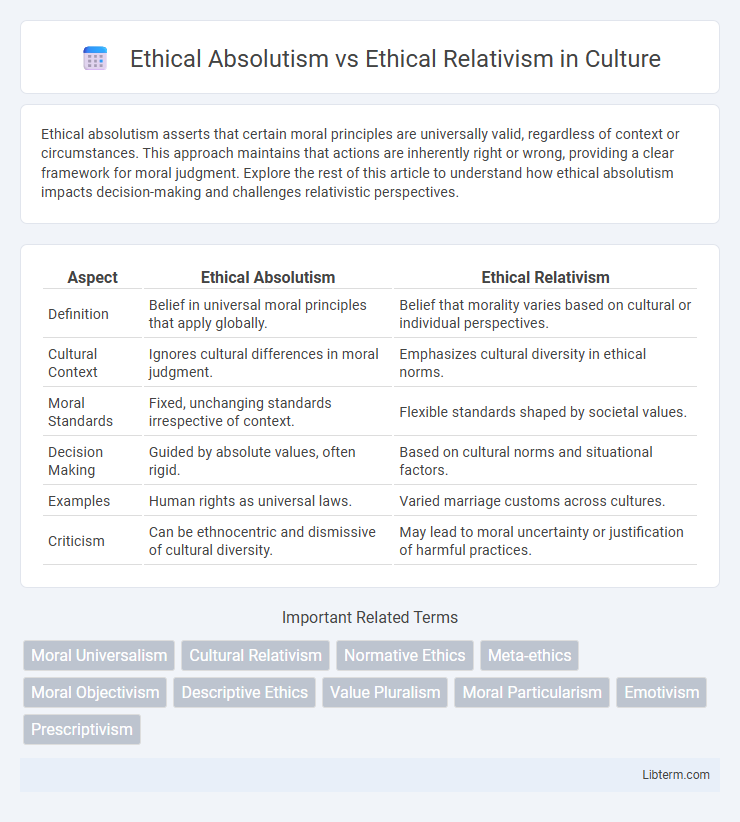Ethical absolutism asserts that certain moral principles are universally valid, regardless of context or circumstances. This approach maintains that actions are inherently right or wrong, providing a clear framework for moral judgment. Explore the rest of this article to understand how ethical absolutism impacts decision-making and challenges relativistic perspectives.
Table of Comparison
| Aspect | Ethical Absolutism | Ethical Relativism |
|---|---|---|
| Definition | Belief in universal moral principles that apply globally. | Belief that morality varies based on cultural or individual perspectives. |
| Cultural Context | Ignores cultural differences in moral judgment. | Emphasizes cultural diversity in ethical norms. |
| Moral Standards | Fixed, unchanging standards irrespective of context. | Flexible standards shaped by societal values. |
| Decision Making | Guided by absolute values, often rigid. | Based on cultural norms and situational factors. |
| Examples | Human rights as universal laws. | Varied marriage customs across cultures. |
| Criticism | Can be ethnocentric and dismissive of cultural diversity. | May lead to moral uncertainty or justification of harmful practices. |
Introduction to Ethical Absolutism and Ethical Relativism
Ethical absolutism holds that certain moral principles are universally valid and unchanging, regardless of cultural or individual differences. Ethical relativism asserts that moral standards vary across cultures and individuals, meaning ethical judgments depend on contextual factors. Understanding these foundational perspectives is essential for analyzing moral conflicts and developing ethical frameworks.
Defining Ethical Absolutism
Ethical Absolutism is the philosophical view that certain moral principles are universally valid and unchanging, regardless of cultural differences or individual beliefs. It asserts that specific actions are inherently right or wrong based on objective standards, such as human rights or justice. This approach contrasts with Ethical Relativism, which holds that morality varies depending on social, cultural, or personal circumstances.
Core Principles of Ethical Relativism
Ethical relativism centers on the principle that moral standards are culturally dependent and no single ethical system holds universal authority, emphasizing the importance of understanding diverse social norms. This theory asserts that actions must be judged within the context of specific cultural, historical, or individual circumstances, rejecting absolute moral rules. Ethical relativism promotes tolerance and open-mindedness toward differing moral beliefs, advocating that ethical judgments are inherently subjective and variable.
Historical Origins and Philosophical Background
Ethical Absolutism traces back to ancient Greek philosophers like Plato and Aristotle, emphasizing universal moral principles applicable to all individuals regardless of context. Ethical Relativism finds its roots in the works of Protagoras and later in 20th-century anthropological studies, arguing that moral standards are culturally and socially dependent. These contrasting views reflect enduring philosophical debates on the nature of morality, truth, and cultural diversity.
Notable Theorists and Key Texts
Ethical absolutism is prominently associated with Immanuel Kant, whose work "Groundwork of the Metaphysics of Morals" emphasizes universal moral principles grounded in reason. Ethical relativism finds key representation in Ruth Benedict's "Patterns of Culture," which argues that moral codes vary across societies and no single standard can be universally applied. These foundational texts illustrate the contrasting views on whether morality is fixed or culturally contingent, shaping ongoing debates in moral philosophy.
Strengths and Weaknesses of Ethical Absolutism
Ethical absolutism's strength lies in its clear, universal moral standards that provide consistent guidance across cultures and situations, fostering fairness and accountability. Its rigidity, however, poses a weakness by failing to accommodate cultural differences and complex moral dilemmas, potentially leading to ethical insensitivity or dogmatism. This inflexibility can create conflicts when diverse moral contexts require nuanced approaches beyond absolute rules.
Strengths and Weaknesses of Ethical Relativism
Ethical relativism emphasizes cultural diversity and promotes tolerance by recognizing that moral values vary across societies, fostering respect for different traditions and preventing ethnocentrism. However, it faces criticism for potentially allowing harmful practices to persist under the guise of cultural norms and for lacking a firm foundation to resolve moral conflicts universally. The flexibility of ethical relativism can lead to ambiguity and challenges in establishing consistent ethical standards across global contexts.
Real-World Applications and Case Studies
Ethical absolutism, which asserts universal moral principles regardless of context, guides human rights enforcement and international law, as seen in the prosecution of war crimes at the International Criminal Court. Ethical relativism, emphasizing cultural and situational nuances, influences business practices in multinational corporations adapting compliance strategies to diverse legal and moral standards across countries. Case studies such as whistleblowing in global supply chains illustrate tensions between absolute ethical mandates and culturally relative norms, highlighting the complexity of applying ethics in real-world scenarios.
Ethical Absolutism vs Ethical Relativism: Points of Conflict
Ethical absolutism asserts that certain moral principles are universally valid, regardless of context or culture, while ethical relativism argues that morality is shaped by cultural, social, or individual perspectives, making no universal standards applicable. The core conflict arises in the application of ethical judgments across diverse societies, where absolutism demands adherence to fixed rules, whereas relativism promotes tolerance of cultural differences and situational ethics. This divergence impacts global issues such as human rights enforcement, legal systems, and international diplomacy, highlighting the tension between uniform moral codes and culturally contingent values.
Implications for Modern Moral Decision-Making
Ethical absolutism asserts that certain moral principles are universally valid, providing a clear framework for consistent decision-making in modern contexts. Ethical relativism emphasizes the importance of cultural and situational factors, allowing flexibility but potentially leading to moral ambiguity and conflicting judgments. Balancing these perspectives impacts policies on human rights, global business ethics, and multicultural interactions by shaping how universal standards and local values are prioritized.
Ethical Absolutism Infographic

 libterm.com
libterm.com